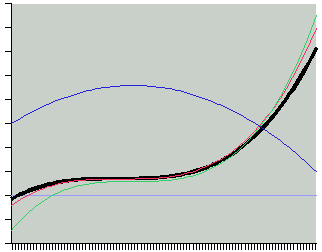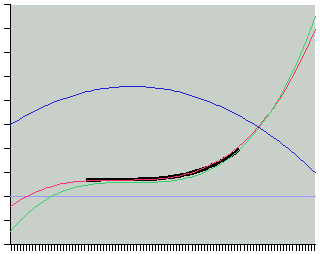Arguments
Science Is Imperfect!
One of the most common general religious attacks on science revolves around a single idea: science is incomplete, imperfect, and therefore unreliable. In order to buttress this seemingly outlandish idea, they will introduce a laundry list of scientific inaccuracies, mistakes, and unexplained anomalies throughout history. What is their objective? Their objective is to convince the audience of two things:
-
The reliability of science is greatly exaggerated by its practitioners, who expect us to simply ignore countless errors and inaccuracies, and take their conclusions at face value.
-
It will always be possible that some new discovery will turn the world of science on its ear just as Einstein's theories of relativity overturned Newtonian physics, and it is "arrogant" of scientists to dismiss this possibility out of hand.
If they can convince you of these two things, they have succeeded. Now, the door is open for them to take an untested theory (eg. Superstring theory or some of the wilder particle physics ideas), use it (or perhaps more accurately, abuse it) to generate wild theoretical speculations which fly in the face of all past observations of the physical universe, and then declare that you have no ground whatsoever upon which to deny their claims.
However, their approach is fundamentally wrong, and it betrays both scientific ignorance and a shockingly simple-minded mentality. Scientists tend to respond to this nonsense by simply pointing out that science is evolutionary rather than revolutionary. New theories improve upon previous theories, rather than turning them completely upside down. For example, Einstein's theories of relativity did not "overturn" Newtonian physics, which are still taught in school and widely used today. They demonstrated superior accuracy, but only in very anomalous conditions. In fact, the predictions of Einsteinian and Newtonian physics are so close in the vast majority of situations that observational evidence for Einstein's theories did not appear until several decades after he had first proposed it, due to limitations in the accuracy of measurement methods at the time.
However, despite these protests, a lot of people (roughly half of all Americans, if creationist polls can be believed) are still susceptible to the idea that it's possible that science will suddenly pull a 180 degree turn.
Black and White?
Pseudoscientists tend to perceive the question of scientific accuracy in simplistic terms of black and white. In other words, science is either "right" or "wrong". It is not a question of just how wrong it is; anything less than perfect accuracy is considered total failure, and supposedly leaves the door open to virtually any alternative theory, no matter how preposterous.
However, it is possible for a theory to be wrong even though science teachers still teach it in schools and engineers still apply it when designing technologies (eg- Newtonian physics). How? It's a simple matter of degrees: a theory which is very slightly inaccurate is still better than a theory which is grossly inaccurate. In some cases, a slightly less accurate theory may even be preferable, if it is easier to apply and the difference in accuracy is deemed negligible.
 Does this sound
crazy? If it does, then try to remember the purpose of science:
it exists in order to describe our universe. Like a police
sketch, a scientific model cannot be judged on a simple-minded
test of whether it is perfect or not; instead, it should be
judged based on its accuracy. Surely, a police sketch
which makes the suspect's nose look too big is still far better
than a sketch which erroneously identifies a male as a female!
Does this sound
crazy? If it does, then try to remember the purpose of science:
it exists in order to describe our universe. Like a police
sketch, a scientific model cannot be judged on a simple-minded
test of whether it is perfect or not; instead, it should be
judged based on its accuracy. Surely, a police sketch
which makes the suspect's nose look too big is still far better
than a sketch which erroneously identifies a male as a female!
Scientific theories are no different; like a mathematical curve fit, they are judged on how closely they can model reality, even if they're not perfect. Perhaps the accompanying line graph will help illustrate this concept: let's suppose the thick black line is a series of measurements, and the other lines are all theoretical predictions.
Take a good look at that graph. We can clearly see that none of the theoretical predictions precisely match observation. However, while a pseudoscientist might conclude that science has therefore failed and we might as well assume that "anything goes", this is quite clearly not the case. The red curve is a very close match, the green curve is not quite as good, and the blue curve is so inaccurate as to be essentially useless. We can't arbitrarily decide that the blue line is just as valid as the others, simply because none of them are perfect!
Can you see the problem with the "all or nothing" approach of pseudoscientists? The green and red lines would be examples of scientific theories, which tend to be refined over time, thus becoming more accurate (ie- going from the green line to the red line). But if, even after decades of refinining our theories, we still haven't achieved perfection, should we suddenly "pull a 180 degree turn" and leap to the blue line? That blue line would be analogous to a typical pseudoscientific theory such as your average creationist theory, or some of the sillier quantum mechanics predictions (eg- power plants that generate limitless energy by tapping into empty space, which has been widely described as the most embarrassing prediction in all of science). Such predictions are so completely at odds with observation that they can be dismissed out of hand, and it is hardly "arrogant" to do so.
Evaluating an "alternate" theory
There's a reason why pseudoscientists prefer to keep their theories in the domain of pure theory rather than application: in any situation where their predictions can be tested, they will be clearly shown to be outlandish. If they can produce a special situation in which their theory is accurate (as in the above graph, where the blue line does intersect the thick black line at one point), they tend to declare victory. But what does it say about a theory when its proponents are reluctant to apply it to every situation?
A new and improved scientific theory will have identical predictions to the old, or "conventional" theory in most situations. Why? Because the old theory would never have been accepted in the first place if its predictions weren't close to measurement. Since those measurements are still valid, the new theory must account for them too.
For example, in mundane situations (ie- normal velocities or densities), relativistic physics produces predictions which are so close to those of Newtonian physics that the difference is negligible. In macroscopic situations (anything above the subatomic scale), quantum physics produces predictions which are identical to those of "classical" physics. In both cases, theories which supposedly "overturned" their precursors actually produce almost identical results in the vast majority of situations. That's typical of a new, improved theory: rather than contradicting the previous theory at every turn, it tends to augment or improve upon it in fringe situations, while it makes exactly the same predictions in mundane situations.
However, when you take a typical pseudoscientific theory and apply it to an everyday situation, the result is usually preposterous. For example, creationist "flood geology" predicts that a chaotic downpour onto loose debris will produce highly ordered, finely layered sediments. However, any experiment with turbulent fluid flow will show no evidence of such behaviour. That, then, is the true litmus test of a decent theory: are its predictions close enough to those of existing theories that it can match their accuracy for mundane, observable situations? Because if they aren't, then there's no point even bothering to look at this theory for more exotic situations
Small scale versus large scale
Creationists try to explain these problems away by saying that while it doesn't work on a small scale, it would work on a large scale. Think about this: they are arguing that a theory which is grossly inaccurate on a small scale will be highly accurate on a large scale! Compare this to their approach with regards to geology and biology, where they claim the exact opposite: theories which are admittedly accurate on a small scale should be expected to fail on a large scale (eg- the ridiculous "microevolution vs macroevolution" argument).
 Consider the
intellectual gymnastics required in order to support their position:
if a theory is totally inaccurate in every situation which we can
observe and measure, why should we give it any credence at all?
Or worse yet, consider it more accurate than a theory which is
highly accurate in all observable, measurable situations? I
refer you once again to the graph earlier in this essay.
Consider the
intellectual gymnastics required in order to support their position:
if a theory is totally inaccurate in every situation which we can
observe and measure, why should we give it any credence at all?
Or worse yet, consider it more accurate than a theory which is
highly accurate in all observable, measurable situations? I
refer you once again to the graph earlier in this essay.
Let's suppose the range of observations is much narrower than the range of predictions which can be generated from theory (a typical situation). This is represented by the truncated black line in the graph. Since we have no observations against which to compare our theoretical predictions at the far right end of the graph, does this mean we have no basis for comparing the accuracy of the various theories at all? Of course not; we may not be able to compare our lines to the black line at the far right end of the graph, but we can compare them in the middle, and it's pretty easy to see which one wins.
In other words, look for predictions which can be tested. When people try to compare theories only with regard to non-testable predictions, they are guilty of pseudoscience. Evolution theory is highly accurate in the observable regime, yet creationists would have you discard it in favour of an "alternative theory" which is not accurate in the observable regime, based on their promise that it will be accurate elsewhere. Does this make sense? Is it "arrogant" to dismiss such speculation out of hand? Of course not. It is science, and unfortunately, that means it's a philosophy with which most creationists are completely ignorant.
Last updated: July 29, 2001
Continue to "If you do not accept Genesis as fact, you are not a Christian!"
Jump to:

